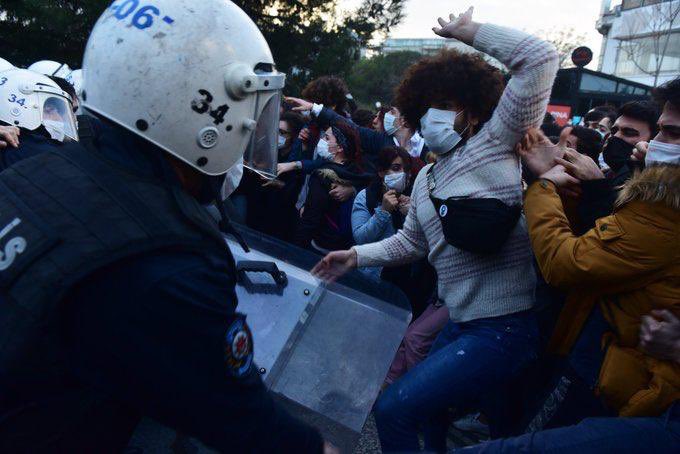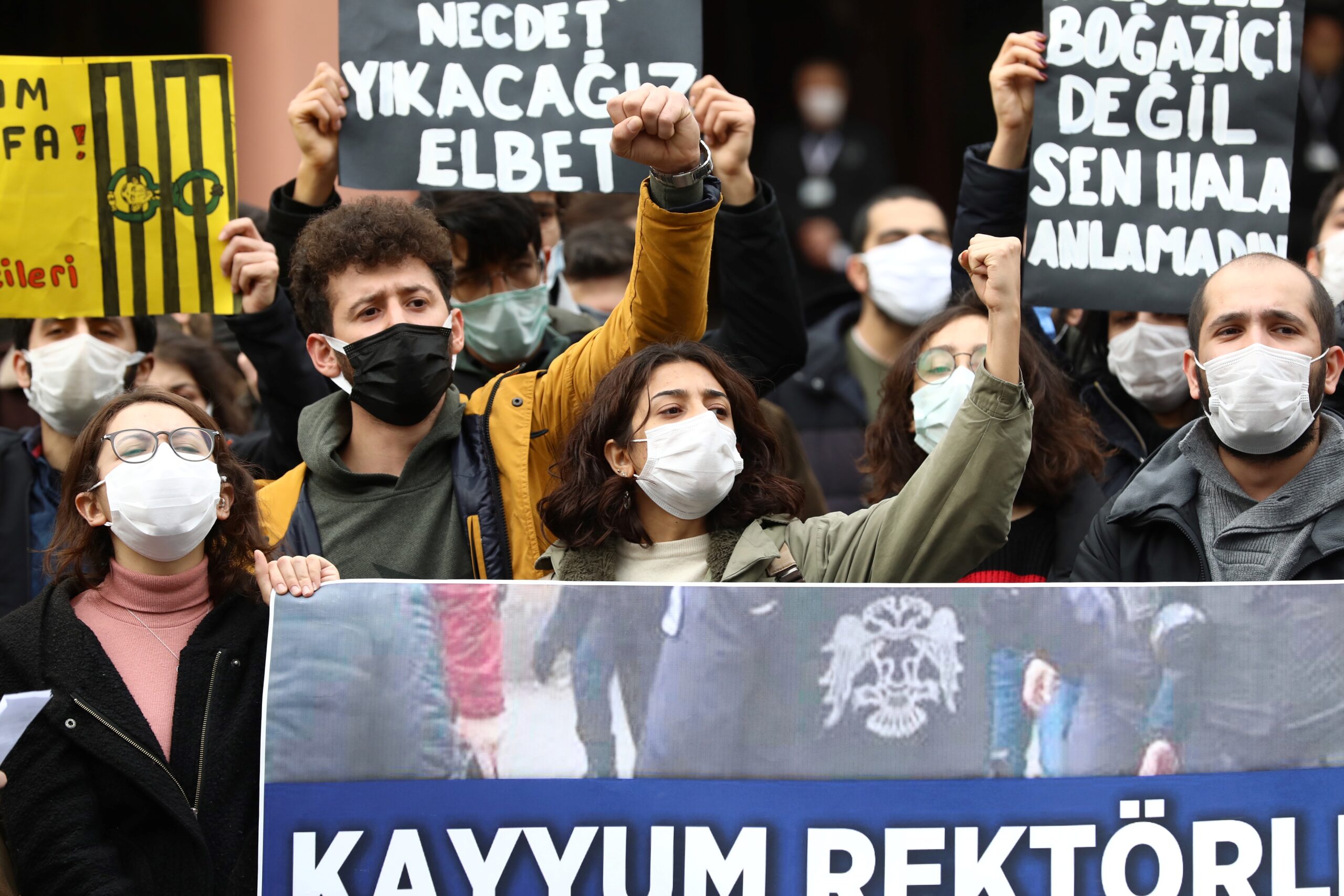Turkey’s strongman, President Recep Tayyip Erdoğan, keeps accusing more of his opponents and the groups opposing his decisions of being “terrorists,” a move seen by critics as a growing attempt to reinforce his authoritarian governance.
Boğaziçi University students who protested a rector appointed by Erdoğan with a presidential decree last week is the latest group that Turkey’s president has accused of terrorism.
Students said in a statement that Melih Bulu, a former member of Erdoğan’s ruling Justice and Development Party (AKP), was the first rector appointed from outside the university since a 1980 military coup.
Erdoğan’s controversial move to appoint a rector with AKP ties as the head of a leading Turkish university was a part of anti-democratic practices that have increased since 2016, when a failed coup prompted the Turkish government to launch a mass crackdown on dissidents, the statement said.

President Erdoğan accused the participants of protests at Boğaziçi of being “terrorists” on Jan. 8.
After showing her support for the students, Canan Kaftancioglu, the Istanbul chair of the main opposition Republican People’s Party (CHP), was labeled by Erdoğan as a militant of the outlawed Revolutionary People’s Liberation Party/Front (DHKP/C).
Earlier in 2018 Erdoğan had targeted Boğaziçi students who protested Ankara’s military campaign in Syria against Kurdish militias.
AFP reported that police stormed a dormitory at Boğaziçi University and detained several anti-war students. In total, 500 people were detained for social media posts and protests condemning the military operation.
Kati Piri, the European Parliament’s Turkey rapporteur, criticized the police operations and tweeted: “Anti-war protesters labelled ‘terrorists’ by President Erdoğan. Critical thinking dangerous endeavour in ‘new Turkey.'”
Anti-war protestors labeled ‘terrorists’ by President Erdogan. Critical thinking dangerous endeavor in ‘new Turkey’. #boğaziciueniversitesi https://t.co/iZZGsjU2pp
— Kati Piri (@KatiPiri) March 25, 2018
Why does Erdoğan label his critics as ‘terrorists’?
Erdoğan’s AKP attempted to change the anti-terror law in 2005 with a draft bill inventing the term “unarmed terrorist organization.”
Due to a mass backlash, it has never been included in the anti-terror law. Still, Erdoğan insisted on the idea of calling people or groups “terrorists” even if they don’t bear arms or resort to any violence.
“It is necessary to redefine terrorism to include those who support such acts,” Erdoğan said in March 2016 following a bomb attack in the Turkish capital of Ankara that killed 37 people.
“There is no difference between a terrorist holding a gun or a bomb and those who use their position and pen to serve their aims [to weaken Turkey]. This could be a journalist, a lawmaker or an activist,” he added.
Erdoğan sees himself as the only judicial decision-maker, according to secular opposition CHP leader Kemal Kilicdaroglu.
He denounced Erdoğan’s comments calling pro-Kurdish Peoples’ Democratic Party (HDP) leader Selahattin Demirtaş a “terrorist” in 2017.
“Only law can decide if someone is a terrorist, but Erdoğan walks in the judiciary’s shoes and declares everyone terrorists,” he told Deutsche Welle.
Erdoğan’s AKP accuses the HDP of ties to a Kurdish insurgent group, the Kurdistan Workers’ Party (PKK), which has waged war in Kurdish-dominated southeastern Turkey for decades and has been designated a terrorist organization by Turkey.
The HDP, the third biggest party in the Turkish Parliament with 56 lawmakers, denies the AKP’s allegations.
However, the HDP’s former co-chairs Demirtaş and Figen Yüksekdağ have been jailed for more than four years on terrorism charges.
Thousands of people, including HDP mayors, party members, and supporters, have been dismissed, detained, or investigated over their political identities, acts or statements.
More on Erdoğan’s ‘terrorist’ list: Gezi protestors, Academics for Peace, Gülenists, journalists
The Turkish government’s vague “terror” definition ended up launching hundreds of thousands of terrorism investigations into hundreds of thousands of people.
The Gezi Park protestors in 2013 were deemed “traitors” by Erdoğan and his government, in a bid to tackle the most significant mass protest against the AKP since it came to power in 2002. Philanthropist Osman Kavala, who was acquitted of “attempting to overthrow the government” last month, is still in prison. Turkish prosecutors accuse him of supporting the 2016 coup attempt.
Erdoğan’s government sees the Gülen Movement, inspired by a cleric in the US, as being behind the coup attempt. The movement, outlawed and designated as a terrorist organization in Turkey, denies its involvement in the failed coup.
However, hundreds of thousands of people have been sacked, prosecuted, and jailed over their alleged Gülen ties since 2016.
Ankara prosecuted some 10,000 people in the six months following the coup attempt for “using social media to support terrorism,” according to the interior ministry.
Turkey has been one of the biggest jailers of journalists in the world since then. The Press in Arrest project announced 62 journalists were behind bars in the country as of the beginning of 2021.
The number of jailed journalists back in 2018 was 160. Erdoğan called journalists critical of the government “protectors” of terrorism the same year:
“Terrorism doesn’t develop by itself. Terror and terrorists have gardeners. These gardeners are people who are seen as ‘intellectuals.’ They water [terrorism] with the columns in their newspapers. And one day, these people show up as terrorists right in front of you,” he said.
Academics for Peace, a group that signed a petition in 2016 calling for peace between the Turkish army and the PKK, was charged with “disseminating the propaganda of a terrorist organization.”
Vegetable sellers, during rising inflation and skyrocketing prices in Turkish markets in 2019, were added to Erdoğan’s terrorist list.
Erdoğan said ahead of local elections: “They’ve caused aubergine, tomato, potato, and cucumber prices to increase. They are spreading terror.”
“They’ve started to play games in Turkey. Prices have begun to escalate. This is terrorism,” he added.
Erdoğan also in January 2017 denounced citizens keeping funds in foreign currencies instead of in the weakening Turkish lira.
“In terms of aims, there is no difference between a terrorist who has a gun and a bomb in his hands and those who have dollars, euros and interest rates. The aim is to bring Turkey to its knees, cow it into submission and take it away from its goals. They are using foreign exchange as a weapon,” he said.
‘Half the country is terrorist’
According to Kilicdaroglu, “Half [of the people in] the country are terrorists to the AKP and its allies.”
“Grocers are terrorists. Salespeople in the bazaars are terrorists. Everyone who doesn’t vote for them is a terrorist. That approach, which we condemn and reject, polarizes the society,” he said during a rally in the western province of Izmir.
Meral Akşener, leader of the opposition IYI (Good) Party, mocked the Turkish president’s “terrorism” rhetoric by greeting her supporters at a joint rally with Kilicdaroglu in the western province of Denizli with Erdoğan’s words:
“Oh! People of Denizli, whom the president calls terrorists, how are you?”
Considering the number of voters for the opposition parties, Akşener blamed Erdoğan for millions in the country being labeled as terrorists.
“The president of the country calls 18 million Turkish citizens terrorists. Terrorists who are only trying to make a living!” she said.

